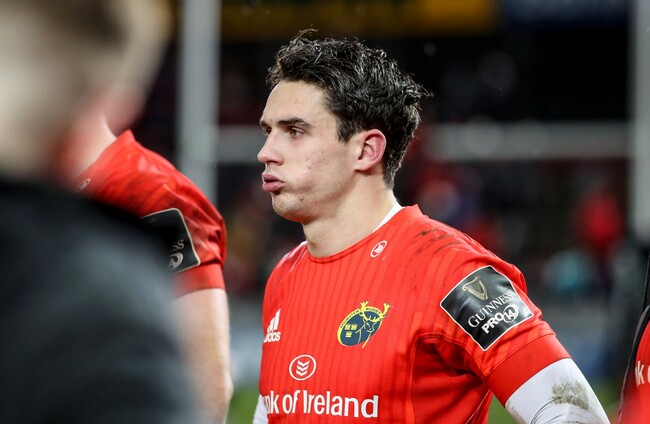Four years after they last crashed out at the pool stages, and 48 hours before their European fate is determined, Alan Quinlan has made it clear that Munster’s players do not deserve to be branded failures if they lose to Racing 92 on Sunday.
Defeat in Paris would spell the end of Munster’s chances of reaching this season’s Champions Cup quarter-finals; a rare experience for a club who have reached the knock-out stages in 17 of the last 20 seasons.
“That’s why Sunday’s result is such a big deal,” Quinlan said. “When you look at the club’s rich history, you can see why a weight of expectation is there.
“That pressure is too much, in my view. Getting to three successive Champions Cup semi-finals (in 2017, 2018 and last year) has been an incredible achievement for this team. If the club don’t get any further this year, people might say it’s a failure. But it’s not.
“You have to look at facts. The player profile now is not the same as it was on the 2006 and 2008 Heineken Cup-winning teams. We often had eight, nine starters on the Ireland team in that era; but at the last World Cup, that number was often down to four.
“You need that context when you are evaluating where Munster are right now.”
Further context is required. In the noughties, semi-final defeats were seemingly acceptable, but now they’re not, even though this generation is nowhere near as talented as the era of O’Gara and O’Connell.
“In my day, we were regarded as being consistent; that we were always knocking on the door, going close,” Quinlan said. “Now, the perception is framed by the manner of the semi-final defeats to Saracens and Racing. They looked different.”
They certainly did. Single-point defeats in the 2000 final, semi-finals of 2001, and 2003 were matched by narrow one-score losses to Wasps in 2004 and Leicester in 2002.
In contrast, Saracens twice defeated Munster by 16 points in the 2019 and 2017 semi-finals, while Racing’s five-point victory in the Bordeuax sunshine was much more comprehensive than the scoreline suggested.
“You need to to find a space in the middle, in terms of expectations,” Quinlan said.
“What I mean by that, is that it is right to set your standards high. Otherwise, you’ll never win anything, never get to a different level.
“Yes, the 2017 defeat to Saracens was an eye-opener but you also have to look at Munster’s budget compared to Racing’s and Saracens’. Truthfully, they have done remarkably well, getting to three straight European semi-finals. ”
Now, however, there is a danger they may not even make it to the quarter-finals.
“The standard Munster have set and adhered to has involved getting out of their pool, no matter who has been in it,” Quinlan, their two-time European Cup-winning flanker, said.
“Being in the knock-out stages is where you need to get to, that was our attitude. However, there has been a lot of mitigating factors with Munster this season. Saracens are former winners; Racing are heavily funded. No one would blink an eye if Racing went on to win the Cup this year.
“You need that context, plus you need to acknowledge Munster’s injury difficulties (Joey Carbery, Tadhg Beirne, Tyler Bleyendaal). So to me, it won’t be a failure to miss out on the play-offs, it is not something I’d describe as unacceptable. Disappointment is the strongest word I would use to describe a pool exit.”
* Alan Quinlan was speaking at the launch of Virgin Media’s spring schedule. Six Nations and Champions Cup rugby will be screened on Virgin Media this spring
***













I don’t see how playing in France is going to prolong his career. Best of luck to him though. A great city and a club on the rise again.
@Cian Nolan: ya didn’t get that. Thought maybe he meant he’d make more money??
Toulon are putting together some pack for next year.
@Darren Byrne: Hopefully Toulouse will be able to challenge them with the addition of Arnold.
@Darren Byrne: Toulon, Toulouse, meanwhile the French youngsters get less and less prime exposure at the top level, the demise of the French team is a bad development for NH rugby.